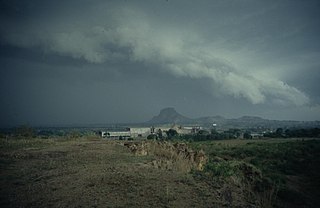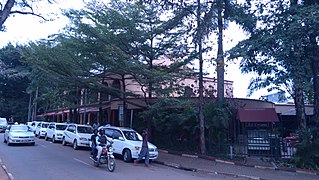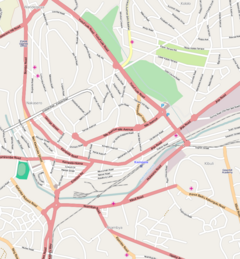
Apollo Milton Obote was a Ugandan politician who served as the second prime minister of Uganda from 1962 to 1966 and the second president of Uganda from 1966 to 1971 and later from 1980 to 1985.

Lira is a city in the Northern Region of Uganda. It is the main municipal, administrative, and commercial centre of Lira District.

Tororo is a town in the Eastern Region of Uganda. It is the main municipal, administrative, and commercial center of Tororo District.

West Nile sub-region, previously known as West Nile Province and West Nile District, is a sub-region in north-western Uganda, in the Northern Region of Uganda.

Uganda Broadcasting Corporation (UBC) is the public broadcaster network of Uganda. It was founded as a result of the "Uganda Broadcasting Corporation Act, 2004", which merged the operations of Uganda Television (UTV) and Radio Uganda. It started broadcasting on November 16, 2005.
Luweero is a town in the Central Region of Uganda. It is the main municipal, administrative, and commercial center of Luweero District.
The 1971 coup d'état in Uganda was the military overthrow of president Milton Obote's government. The coup was staged by major general Idi Amin Dada, commander of the Uganda Army. The seizure of power occurred on January 25 while Obote was attending the Commonwealth Heads of Government Meeting in Singapore. For various reasons, relations between Obote and Amin—his army commander—had become insidiously strained. Amin's plot was primarily driven by a concern to retain power over the military hence guaranteeing his own personal survival. After the coup's success, Amin installed himself as president; ruling—until 1979—by decree over an impoverished nation. He is often referred to as one of the most brutal dictators in modern political history
Bombo is a town in Luweero District in the Central Region of Uganda.
Diamond Trust Bank Uganda Limited (DTBUL), is a commercial bank headquartered in Uganda. It is licensed and supervised by the Bank of Uganda, the central bank and national banking regulator.
Muyenga is a hill in Kampala, the capital of Uganda and the largest city in that country. The name also applies to the upscale community that sits on that hill.

Nakasero is a hill and neighborhood in the centre of Kampala, the capital and largest city of Uganda. Nakasero is important to Uganda's economy and politics, as it is home to Kampala's central business district and several government offices, including the Ugandan Parliament Buildings.

The Kampala Serena Hotel is a hotel in Kampala, the capital and largest city of Uganda. The hotel is rated 5-stars by the Uganda Tourism Board.

Kampala Speke Hotel is a hotel in Kampala, the capital and largest city in Uganda, the third-largest economy in the East African Community.
Opportunity Bank Uganda Limited (OBUL), is a Tier II credit institution in Uganda. It was previously registered as a commercial bank by the Bank of Uganda, the central bank and national banking regulator. The institution received a commercial banking license on 25 September 2019.
FINCA Uganda Limited, also known as FINCA Uganda, is a microfinance deposit-accepting institution (MDI) in Uganda. It is licensed and regulated by the Bank of Uganda, the central bank and national banking regulator.

Munyonyo Commonwealth Resort is a five star hotel-resort in Kampala, the capital and largest city in Uganda, the third-largest economy in the East African Community.
The Speke Resort and Conference Centre is a hotel-resort-conference-centre in Kampala, the capital and largest city of Uganda, the third-largest economy in the East African Community. It is one of the five 4-star hotels in Kampala, as rated by the Uganda Tourism Board in June 2015.
Quality Supermarkets is a Ugandan supermarket chain.

The Ministry of Gender, Labour and Social Development (MGLSD) is a Cabinet-level government ministry of Uganda. The mandate of the ministry is to empower citizens to maximize their individual and collective potential by developing skills, increasing labour productivity, and cultural enrichment to achieve sustainable and gender-sensitive development. The ministry is headed by a Cabinet minister, Betty Amongi Akena.
The Uganda Roads Fund (URF) is a government agency mandated to finance routine and periodic maintenance of public roads in Uganda. Established by an Act of Parliament in 2008, the agency raises monies through various means, independent of general government taxation regimes, and disburses those funds to repair and maintenance agencies, based on agreed work programmes.












